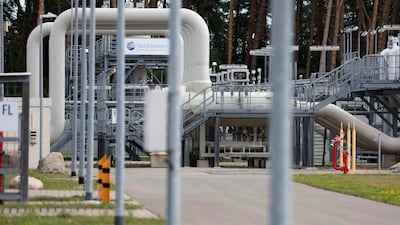Germany may resort to rationing gas to combat drastically reduced supplies after last week's announcement by Russia's state oil company Gazprom that it was turning off its Nord Stream pipeline into Europe indefinitely due to technical difficulties.
The decision has piled pressure on a region already in the grips of an energy crisis, and German gas importer Uniper said on Monday it was mulling legal action over Gazprom's decision, which has led to surging European gas prices and the euro retreating to a two-decade low.
The unpropitious outlook prompted France on Monday to announce a reciprocal partnership with Germany in which they will support each other in terms of supplies when the need arises.
EU Commission President Ursula von der Leyen also suggested the bloc could seek to offer liquidity help to European energy firms.
Neither of these measures may be sufficient to avoid the previously unthinkable prospect of gas rationing in a major European economy, said Uniper chief Klaus-Dieter Maubach.
“We cannot rule out that Germany might look at rationing gas as something that might have to be considered,” he said.
“We know that the government wants to avoid this as much as possible because that would be a disaster for so many reasons.”
Mr Maubach also disputed Gazprom's explanation for the Nord Stream 1 shutdown, saying it was clearly politically and not technically motivated. He added that Uniper was considering legal action as a result.
“The curtailment [of gas flows] was never a technical issue, but a political decision. As such, it will continue to be a political decision,” he told attendees on the first day of the Gastech conference in Milan, Italy.
“Whether the flows will increase or decrease, I would dare to say this has been decided in the Kremlin and not in Gazprom headquarters.”
Despite the pressures on supply, Germany is sticking to its long-held plan of shutting down the country’s three remaining nuclear power plants this year but keeping the option of reactivating two of them, officials said on Monday.
It will also work with France after an accord between the two countries was reached regarding gas redistribution, French President Emmanuel Macron told a news conference following a phone call with German Chancellor Olaf Scholz.

“Germany needs our gas and we need power from the rest of Europe, notably Germany,” Mr Macron said. He added that the necessary connections for France to deliver gas to Germany when needed would be finalised in the coming months.
Mr Macron expressed support for power connections across Europe but, following criticism from Spain, said he did not understand demand for a third gas link between France and Spain.
On Monday, he called for a sharp 10 per cent reduction in the country’s energy use in the coming weeks and months to avoid the risk of rationing and cuts this winter.
Mr Macron said that forced energy savings might have to be considered if voluntary efforts are not enough.
He said energy rationing plans are being prepared “in case” they are needed and that “cuts will happen as a last resort".
“The best energy is that which we don’t consume,” the French leader said at a news conference, where he urged businesses and households to save energy through measures such as turning down heating and air conditioning.
The EU is preparing emergency plans to cap prices or separate power prices from the soaring cost of gas — as well as longer-term reforms aimed at ensuring electricity prices reflect cheaper renewable energy.
Energy ministers from EU countries will meet on September 9 to discuss how to ease the burden of soaring energy prices on businesses and households as a matter of urgency.
Mr Macron said France was in favour of buying gas at a European rather than a national level, and called for EU measures to control energy prices.
Separately, Ms von der Leyen outlined some of the possible proposals on Twitter, which include liquidity help for companies.
Many companies are finding it increasingly difficult to manage margin calls, an exchange requirement for extra collateral to guarantee a trading position when prices rise.
Sweden and Finland created emergency backstops at the weekend to help utilities struggling with collateral requirements.
The uncertainty led to European stocks slumping and the euro falling to a near two-decade low on Monday while the dollar strengthened.
The pound declined to its lowest level since 1985 but then steadied after the UK’s Conservative Party named Liz Truss as its leader, clearing her way to become prime minister.
Her plan to “turbocharge” the economy by slashing taxes is already worrying investors amid double-digit inflation.
Oil gained as Opec+ unexpectedly agreed to make a token oil supply cut for October.


